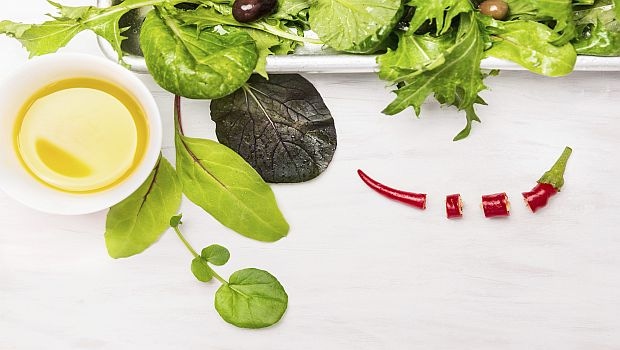Here salad dressing farm-to-label brand builds a clean supply chain with locally farmed ingredients.
August 23, 2018

A lawyer by trade, Megan Klein always had the heart of an environmentalist. After graduating from law school in 2006, she launched her career at an energy practice. Unsatisfied because she felt like she was contributing to the end of the world, she sought different employment, becoming a lawyer for Earth Justice. As time went on, Klein felt she could make a better impact in the food industry through business, so she loaded everything and moved from New York to Chicago.
On the scene in Chi-Town, Klein assisted the city with implementation of the Chicago Urban Agriculture Ordinance, which created three sub-categories of urban agriculture—indoor, outdoor and rooftop production—to encourage the productive use of space that might otherwise sit stagnant. Now, residents could farm correctly and legally, Klein said.
In addition, she founded a boutique law practice to help small food businesses in Chicago, but longing to dig into farming, she also started an indoor organic hydroponic farm. Eventually, the farm strategically shut down, and Klein aspired to work with farmers once again.
Vegetable Concoctions and Research
Seeing the need to put “real vegetables into products,” Klein experimented with different ingredient combinations to create salad dressings.
“Some salad dressing brands have pictures of vegetables on their labels, but if you actually read the label, no vegetables are listed,” Klein explained as her main reason to create a salad dressing made with microgreens and fresh basil that would become her first retail product.
Klein continued to perfect her recipes as she performed market research, specifically on the word “local.” She discovered the meaning of the word is personal and means something different to each person.
“I thought most people would think it [‘local’] meant a 30-mile radius of all the places they normally go or interact with in their daily lives,” Klein said. “However, the research showed people view the word ‘local’ to mean ‘fresh,’ ‘supportive of community’ and ‘trust.’” The research also showed people trusted farmers four-to-one over food companies, she added.
Having a soft spot for farmers herself, along with the gumption to share sources of local produce with consumers in more convenient ways, Klein concluded her mission was to build trust by working directly with fresh fruits and vegetables, and farmers.
“Here” and Now
With flavorful salad dressing recipes—such as Michigan Apple Balsamic, Carrot Sesame Miso and Original Sweet Basil—at the ready, in May 2017, Klein launched her farm-to-table brand Here that brings people closer to their food by creating locally sourced and produced food to nourish the body and planet.
“We rebranded our salad dressings, and added veggie hummus and cold-pressed juices,” Klein explained. “All of our products are sold in the produce section of retails stores, and consumers can eat real veggies in processed foods.”
Here is not only a brand, but has evolved into a production facility with a team of 30 people, all with the same goal—to improve the food system and the supply chain. For example, Michigan has the perfect climate and soil to grow beans, but “farmers are not marketers, so they are selling their beans in small packages, not getting the most money for their quality beans,” Klein explained. Here became the first company to put Michigan beans into fresh, packaged food products for consumers.
Using locally farmed beans led to Here’s most innovative product to date—hummus with vegetables replacing the oil and tahini found in typical pre-packaged hummus. The base beans for the hummus are sourced from the Michigan farm, Carlson-Arbogast, a fifth-generation family farm operated by Fran Arbogast and her son. Klein visited the farm, discovered she loved the way the beans were grown and a sustainable partnership was formed.
Here also improves the supply chain by getting real, non-commodity produce into it, thus, reducing waste. Although hard to quantify, Klein said in 2017, Here used 20 percent imperfect produce, such as apples from BelleHarvest, a distribution partner to several Michigan apple farms.
“We took the ugly ones [apples] that consumers likely would not purchase off retail shelves and used them in our products,” Klein said.
Since its launch, the people who make up Here have been busy. In 2017, Here applied to become a certified B Corp and gave one percent of its 2017 profit back to farmers. Here also works with the Windy City Harvest Apprenticeship program, part of Chicago’s Botanic Gardens that enrolls 15 to 20 students annually to complete a hands-on certification program in sustainable urban agriculture. Here has some of the program’s graduates on its staff currently.
Klein has spent the past year getting to really know the Here customers and exactly what they want, which is “local” food. Remember, “local is not tied to geography; people want to know the farmer and trust the food,” she said. “This is what ‘local’ means to most consumers.”
Because of this, Here is looking to expand outside the Midwest to continue to build the supply chain.
Editor’s Note: The Esca Bona Supplier Heroes is a recurring feature of suppliers that fuel innovation in the good food supply chain. These features explore the brand story, innovation, supply chain investment, research and partnerships that these companies undertake to improve the food system and consumer health. We select suppliers based on their commitment to the good food movement, their story, their sustainability initiatives, their focus on safe and efficacious ingredients, and their partnerships with their finished product customers.
Esca Bona is an event and brand spearheaded by New Hope Network that champions the good food movement by helping finished product brands improve their supply chain, support the people who create food, and best harness technology and innovation.
If you know of—or are—a supplier with a story to tell, email Sandy Almendarez, editor in chief, Natural Products INSIDER at [email protected].
You May Also Like




.png?width=800&auto=webp&quality=80&disable=upscale)